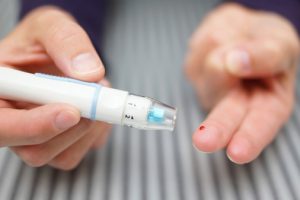
Typically, when we eat food the contents get broken down and converted into glucose so that we become energized. Post-meal our blood-sugar spikes, and the food we eat determines how high the spike is and how quickly it will fade out. For example, if we eat something that is sugary, we may experience a sudden spike followed by a crash. If we eat foods high in fiber, our blood sugar levels will maintain a normal level for longer.
Although it’s more common to associate the foods we eat to spikes in our blood sugar, there are other factors which can contribute to uncontrolled blood sugar. Whether you’re diabetic or not, here are four other non-food reasons why you may experience spikes in your blood sugar.
4 reasons your blood sugar spikes
Medication
Common medications which can spike blood sugar are asthma medications, certain antidepressants and corticosteroids.
Poor sleep
The National Foundation of Sleep suggests that poor sleep is linked to spikes in sugar because it decreases cortisol – the stress hormone – and nervous system activity which occurs while asleep. Both of these aspects, along with some other nightly changes, have affects on blood sugar, so if you’re not getting proper sleep, make the right changes to ensure you do.
Poor oral hygiene
Even if you don’t have diabetes, although more care on oral hygiene should be paid if you do, always remember to brush and floss daily to maintain good health.
Lack of exercise
Other research found in the journal Medicine and Science in Sports and Exercise showed only three days of inactivity in healthy adults was enough to cause spikes in blood sugar. The key here is to stay active as often and as much as possible, even if it’s only 10 to 15 minutes a day.
Of course, food plays a large role in blood sugar spikes, but don’t neglect these other causes of blood sugar spikes either. If you’re diabetic, you need to work harder to achieve a healthy lifestyle in order to properly maintain healthy blood sugar levels and not worsen the diabetes. Even if you’re healthy, spikes in blood sugar can be detrimental; be mindful about what you eat, how much you sleep, your oral hygiene, medications you are taking and how often you’re exercising.
Related Reading:
Joint pain with type 2 diabetes linked with DPP-4 inhibitor
Researchers uncovered that joint pain in people with type-2 diabetes is linked with the use of dipeptidyl peptidase-4 (DPP-4) inhibitors. The FDA has made an announcement adding additional warnings to DPP-4 inhibitors, stating it can increase joint pain in users with type-2 diabetes. Continue reading…
Use of antibiotics increases type 2 diabetes risk
Before you take another antibiotic, here’s something you might want to consider. A Danish study revealed that the use of antibiotics might increase the risk of type-2 diabetes, a condition that increases the risk of heart disease and other problems. Continue reading…
Sources:
http://www.everydayhealth.com/hs/type-2-diabetes-care/everyday-things-spike-blood-sugar-pictures
http://www.medicalnewstoday.com/articles
http://www.webmd.com/diabetes/features/diabetic-diet-6-foods-control-blood-sugar